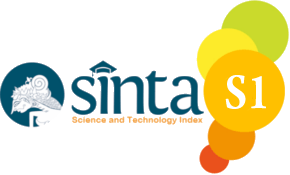EVALUASI KOMPETENSI PEDAGOGIK GURU PAI PADA SMA NEGERI SE KOTA PANGKALPINANG (Penerapan Model Evaluasi CIPP)
Abstract
The teacher as a profession is personified as a person who is able to transform knowledge well in order to educate the nation's children. This study focuses on evaluating the pedagogic competency of Islamic Religious Education (PAI) teachers in the preparation of learning planning, preparing learning procedures, managing learning and evaluating learning outcomes. This study aims to determine the planning, management, and evaluation of learning. This study uses a qualitative approach with the CIPP evaluation model (context, input, process, and product), while the object of the research is Pangkalpinang City State High School with the subject being the PAI study teacher. Data collection techniques are observation, interviews and documentation studies. The results of the study found that the context (learning planning) of PAI teachers was guided by the education service circular. Inputs (preparation and procedures) are carried out periodically and continuously. Process is carried out by facilitating the development of students' interests and potential. While the product (evaluation of student learning outcomes) is done orally and in direct practice. Whereas (product) evaluation of student learning outcomes is carried out orally and in direct practice. Evaluation of pedagogic competencies of PAI teachers of high schools, carried out by school principals and school supervisors periodically with guided by the education service circular.
Keywords
Full Text:
PDFReferences
Anas Sudijono, (2008), Pengantar Evaluasi Pendidikan, Jakarta: PT. Raja Grasindo Persada.
Daniel L. Stufflebeam dan Anthony J. Shinkfield, (2007), Evaluation Theory, Models, & Applications, San Francisco: Jossey-Bass.
Daniel L. Stufflebeam dan Chris L. S. Coryn, (2014), Evaluation Theory, Models, and Applications, Jossey-Bass.
Djudju Sudjana, (2006), Evaluasi program pendidikan luar sekolah untuk pendidikan nonformal dan pengembangan sumber daya, Bandung: Remaja Rosdakarya.
E. Mulyasa, (2005). Menjadi Kepala Sekolah Profesional : Dalam Konteks menyukseskan MBS dan KBK, Bandung : Rosdakarya.
Engkoswara, (2010). Administrasi Pendidikan, Bandung : Alfabeta.
Husaini Usman, (2006). Manajemen: Teori, Praktik dan Riset Pendidikan, Jakarta: Bumi Aksara.
Janawi, (2012), Kompetensi Guru Citra Guru Profesional, Bandung: Alfabeta
Kunandar, (2007). Guru Profesional : Implementasi KTSP dan Kesiapan Menghadapi Sertifikasi Guru. Jakarta : Raja Grafindo Persada.
M. Sukardi, (2011), Evaluasi Pendidikan: Prinsip dan Operasional, Jakarta: Bumi Aksara.
Peraturan Pemerintah Republik Indonesia Nomor 19 tahun 2005 tentang Standar Nasional Pendidikan.
Raka, T. Joni dan Entang, (1985), Pengelolaan Kelas. Jakarta : Departeman Pendidikan dan Kebudayaan.
Rohiat, (2012), Manjemen Sekolah:Teori Dasar dan Praktik, Bandung: PT. Refika Aditama.
Sugiono, (2013), Metode Penelitian Kuantitatif, kuantitatif dan R&D), Bandung: Alfabeta.
Suryadi, Ace. dan Budimansyah. (2004). Pendidikan Nasional Menuju Masyarakat Indonesia Baru. Bandung: PT. Genesindo.
Udin Saefudin Saud, (2009), Pengembangan Profesi Guru, Bandung: CV. Alfabeta
Undang-Undang Nomor 14 Tahun 2005 tentang Guru Dan Dosen, Bandung : Tamita Utama.
Undang-Undang Nomor 20 tahun 2003 tentang Guru dan Dosen, Bandung : Fermana.
Website
http://prodipps.unsyiah.ac.id/Jurnalmap/images/Jurnal/volume/vol.1/vol.1.1/2.14.28.baihaqi.pdf 21 Februari 2016
http://bemstkipabdya.blogspot.co.id/2011/07/stkip-muhammadiyah-abdya.html/ (21 September 2015)
http://lampost.co/berita/darurat-pembenahan-manajemen-pendidikan/arurat, Pembenahan Manajemen Pendidikan/ (12 September 2015)
http://www.kompasiana.com/ahmadturmuzi/pengembangan-kompetensi-guru-menuju-pelaksanaan-dan-tanggung-jawab-secara-profesional, diakses 10 Februari 2017.
Refbacks
- There are currently no refbacks.
Welcome to Jurnal Ilmiah Islam Futura (JIIF) open journal system. Thank you very much for visiting. We are looking forward to getting your research articles
Jurnal Ilmiah Islam Futura
All works are licensed under CC-BY
©Published by Center for Research and Community Service (LP2M) in cooperation with the Postgraduate Program of UIN Ar-Raniry Banda Aceh, Aceh, Indonesia.





